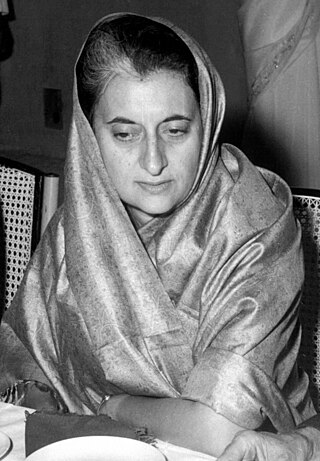Related Research Articles

The All India Forward Bloc (abbr.AIFB) is a left-wing nationalist political party in India. It emerged as a faction within the Indian National Congress in 1939, led by Subhas Chandra Bose. The party re-established as an independent political party after the independence of India. During the 1951–1952 and 1957 Indian general election, the party was known as Forward Bloc (Marxist). It has its main stronghold in West Bengal. The party's current Secretary-General is G. Devarajan. Veteran Indian politicians Sarat Chandra Bose (brother of Subhas Chandra Bose) and Chitta Basu had been the stalwarts of the party in independent India.

The Peasants and Workers Party of India (PWP) is a Marxist political party in Maharashtra, India. The party was founded in 1948, having its roots from the pre-Independence period and has around 10,000 members. The influence of the party is largely limited to three districts. The party was founded in Maharashtra by Keshavrao Jedhe of Pune, Shankarrao More, Bhausaheb Raut of Mumbai, Nana Patil of Satara, Tulshidas Jadhav of Solapur, Dajiba Desai of Belgaum, Madhavrao Bagal of Kolhapur, P K Bhapkar and Datta Deshmukh of Ahmednagar, Vithalrao Hande and others.
Krishikar Lok Party was a political party in the Hyderabad State, India, which existed from April to June 1951. The KLP was formed when Acharya N. G. Ranga separated from the Hyderabad State Praja Party.

General elections were held in India between 1 and 10 March 1971 to elect members of the fifth Lok Sabha. They were the fifth general elections since independence in 1947. The 27 Indian states and union territories were represented by 518 constituencies, each with a single seat. Under the leadership of Indira Gandhi, the Indian National Congress (R) led a campaign which focused on reducing poverty and won a landslide victory, overcoming a split in the party and regaining many of the seats lost in the previous election.
The Workers and Peasants Party (WPP) (also known as the Kirti Kisan Party) was a political party in India, which worked inside the Indian National Congress in 1925–1929. It became an important front organisation for the Communist Party of India and an influential force in the Bombay labour movement. The party was able to muster some success in making alliances with other left elements inside the Congress Party, amongst them Jawaharlal Nehru. However, as the Communist International entered its 'Third Period' phase, the communists deserted the WPP project. The WPP was wound up, as its leadership was arrested by the British authorities in March 1929.

Gangadhar Appa Burande was an Indian politician.
Rashtriya Samaj Paksha is an Indian political party based in Maharashtra, founded in 2003. Mahadev Jankar was the founder and President of the party. Prabodhankar Govindram Shurnar, hailing from Nanded, has dedicated himself to social work in his community since 1990. Mr. Govindram Shurnar and Mahadev Janakar first met during an event in Mumbai, and this encounter paved the way for Mahadev Jankar to launch their endeavors in Marathwada, with the support of Govindram Shurnar. In the 1998 Lok Sabha elections in Nanded, Mahadev Jankar ran as a BSP candidate and garnered around 20,000 votes. Mr. Govindram Shurnar and their family played a significant role in managing the responsibilities for that election.
Baddam Yella Reddy was an Indian communist politician from Telangana. He was one of the prominent leaders in the Telangana armed struggle against the Nizam regime.
Elections were held in March 1952 for the Bihar Legislative Assembly. There were 276 constituencies with 50 of them being two-member constituencies. The Indian National Congress (INC) stormed into power. Shri Krishna Singh became the first elected Chief Minister of Bihar and Dr. Anugrah Narayan Sinha became the first Deputy Chief Minister cum Finance Minister of the state.
The Uttar Pradesh Revolutionary Socialist Party was a left-wing political party in Uttar Pradesh, India 1951–1952. It held one seat in the Uttar Pradesh Legislative Assembly. The party ended up merging with the Communist Party of India.

Shripad Krishna Limaye was an Indian politician and trade unionist. Limaye served as a member of the Rajya Sabha from Maharashtra in the 1960s.
Drupad Borgohain was an Indian politician. He was a veteran leader of the left-wing in the Assam state. As of 2014 he was the secretary of the Assam State Council of the Communist Party of India (CPI), a position he held since 1987. As of 2010 he served as president of Assam state council of All India Kisan Sabha.
Nurul Huda was an Indian politician, former Member of Parliament and former Member of the Legislative Assembly of Assam. A leader of the Communist Party of India (Marxist), Nurul Huda belonged to the Central Committee of the party.
Although a parliamentary democracy, Indian politics has increasingly become dynastic, possibly due to the absence of a party organization, independent civil society associations that mobilize support for the party, and centralized financing of elections. Family members have also led the Congress party for most of the period since 1978 when Indira Gandhi floated the then Congress(I) faction of the party. It also is fairly common in many political parties in Maharashtra. The dynastic phenomenon is seen from national level down to district level and even village level.The three-tier structure of Panchayati Raj established in the 1960s also helped to create and consolidate the dynastic phenomenon in rural areas. Apart from government, political families also control cooperative institutions, mainly cooperative sugar factories, district cooperative banks in the state, and since the 1980s private for profit colleges. The ruling Bharatiya Janata Party also features several senior leaders who are dynasts. In Maharashtra, the NCP has particularly high level of dynasticism.
Uddaraju Ramam was an Indian politician. He was a parliamentarian and a leader of peasants movement. He has three sons and two daughters,

Parbhani Assembly constituency is one of 288 assembly constituencies of Maharashtra state of India. It comes under Parbhani Lok Sabha constituency for Indian general elections.
Homi F. Daji was a member of the 3rd Lok Sabha of India. He represented the Indore constituency of Madhya Pradesh and was a member of the Communist Party of India.
Bijapur South Lok Sabha constituency was a former Lok Sabha constituency in Karnataka. This seat came into existence in 1951. Before 1967 Lok Sabha Elections, it ceased to exist.
The All India United Kisan Sabha was a peasants organization in India. The AIUKS was founded around the late 1940s by Swami Sahajanand Saraswati. Sahajanand had broken away from the All India Kisan Sabha in 1945, being opposed to the increasing communist domination of the movement. To form the new AIUKS, Sahajanand gathered Congress Socialist Party members and other Indian National Congress left-wing elements.

In 1964, a major split occurred in the Communist Party of India. The split was the culmination of decades of tensions and factional infighting. When India became independent in 1947, differences arose of how to adapt to the new situation. As relations between the Nehru government and the Soviet Union improved, a faction that sought cooperation with the dominant Indian National Congress emerged within CPI. This tendency was led by S.A. Dange, whose role in the party hierarchy became increasingly controversial. When the Sino-Indian War broke out in 1962 Dange's opponents within CPI were jailed, but when they were released they sought to challenge his leadership. In 1964 the party was finally divided into two, with the left faction forming the Communist Party of India (Marxist). The split had a lot of regional variations. It also impacted other organizations, such as trade union and peasant movements. The split has been studied extensively by scholars, who have sought to analyze the various domestic and international factors involved.
References
- 1 2 V.V. Giri National Labour Institute (2004). Agrarian structure, movements & peasant organisations in India. V.V. Giri National Labour Institute. p. 171. ISBN 978-81-7827-064-7.
- 1 2 Christophe Jaffrelot; Sanjay Kumar (4 May 2012). Rise of the Plebeians?: The Changing Face of the Indian Legislative Assemblies. Routledge. p. 226. ISBN 978-1-136-51661-0.
- ↑ Indian Press Digests Project; Margaret Welpley Fisher; Joan Valérie Bondurant (1956). The Indian experience with democratic elections. Institute of International Studies, University of California. p. 112.
- 1 2 3 4 S. N. Sadasivan (1977). Party and democracy in India. Tata McGraw-Hill. p. 96. ISBN 9780070965911.
- 1 2 Election Commission of India. STATISTICAL REPORT ON GENERAL ELECTIONS, 1951 TO THE FIRST LOK SABHA Archived 2014-10-08 at the Wayback Machine
- 1 2 Election Commission of India. KEY HIGHLIGHTS OF GENERAL ELECTION, 1951 TO THE LEGISLATIVE ASSEMBLY OF BOMBAY
- ↑ Shiv Lal (1978). Elections in India: An Introduction. Election Archives. p. 47.
- ↑ D. Sundar Ram (1996). Readings in the Indian Parliamentary Opposition. Kanishka Publishers, Distributors. p. 370. ISBN 978-81-7391-116-3.